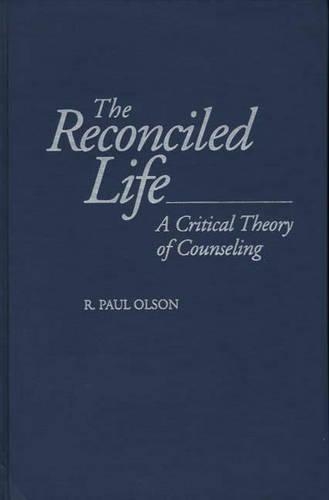
The Reconciled Life: A Critical Theory of Counseling
(Hardback)
Publishing Details
The Reconciled Life: A Critical Theory of Counseling
By (Author) R. Paul Olson
Bloomsbury Publishing PLC
Praeger Publishers Inc
25th November 1997
United States
Classifications
Tertiary Education
Non Fiction
Psychotherapy: counselling
Social counselling and advice services
Religion: general
Theology
616.8914
Physical Properties
Hardback
280
Description
Using a method of critical correlation, the author recommends an interaction between clinical psychology and liberal theology which preserves their unique sources, methodologies, and content, while engaging in a mutually enriching dialogue. This work illustrates a constructive interaction between these disciplines by applying the concept of reconciliation derived from the Judeo-Christian tradition as a foundation for a normative and empirical theory of psychotherapy. Linguistic and phenomenological analyses of the cognitive, affective, behavioral, and conative dimensions provide an understanding of the experience of reconciliation compatible with the teachings of Jesus of Nazareth.
Reviews
"In this scholarly and wide ranging work more representative of the best of the Renaissance than of many narrowly focused modern works, he uses the concept of reconciliation as a focal point to create a dialogue between the disciplines of liberal theology and humanistic psychology....Of particular benefit to those engaged in the practice of counseling. Paul uses reconciliation as a theoretical foundation from which to develop an essential understanding of the goals and purposes of working therapeutically with people who are in pain. Such a book is not only helpful, but needed. I recommend it highly to practioners interested in a theological grounding of their therapeutic work with others and to theoreticians who will find much to stimulate their own thinking."-Jack B. Schaffer, M.Div. Visiting Professor of Psychology Hamline University
"Paul Olson's The Reconciled Life demonstrates that psychotherapy can not escape religious and ethical foundations and that Christianity can provide these needed foundations. This book is essential reading for the religious counselor and should not be missed by the secular counselor."-Don S. Browning Alexander Campbell Professor of Religious Ethics and the Social Sciences University of Chicago Divinity School
"R. Paul Olson has created a new theory of counseling and an amazingly comprehensive multi-disciplinary meeting site where psychologists, theologians, philosophers, and ethicists can further develop a theory and method of counseling that puts reconciliation at the center....In an age of highly technical specialization in all disciplines, it is like a breath of fresh air to find a theologian-psychologist willing to risk a larger, synoptic project. Specialists will find specific points of judgment to challenge, but that is exactly the kind of dialogue that Olson invites. May his invitation to dialogue be richly reciprocated!"-Clyde J. Steckel, Emeritus Professor of Theology United Theological Seminary of the Twin Cities
.,."this thoughtful and helpful work suggest the concept of reconciliation as a foundation for the practice of pastoral counseling. This work will be of interest not only to psychotherapists, but to theologians and others interested in the question of what constitutes a good life."-Religion Studies Review
...this thoughtful and helpful work suggest the concept of reconciliation as a foundation for the practice of pastoral counseling. This work will be of interest not only to psychotherapists, but to theologians and others interested in the question of what constitutes a good life.-Religion Studies Review
..."this thoughtful and helpful work suggest the concept of reconciliation as a foundation for the practice of pastoral counseling. This work will be of interest not only to psychotherapists, but to theologians and others interested in the question of what constitutes a good life."-Religion Studies Review
Author Bio
R. PAUL OLSON is a Professor at the Minnesota School of Professional Psychology, where he teaches psychotherapy and spiritual direction, religious anthropologies, integrative psychotherapy, health psychology, and professional ethics. He received an M.Div. from Yale Divinity School, and his Ph.D. in clinical psychology from the University of Illinois-Urbana.
